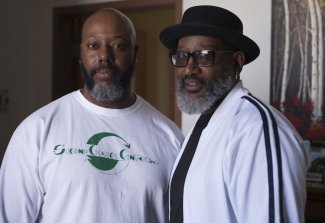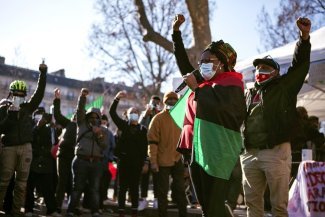Ndume Olatushani, left, is a former death row inmate. Jerry Givens, right, was the chief executioner for the state of Virginia. Both men are now advocating for the abolition of the death penalty.
Ndume Olatushani spent 20 years on Tennessee’s death row for a crime he did not commit. Jerry Givens was the chief executioner for the state of Virginia for 17 years, during which he oversaw the execution of 62 people. Though their experiences with capital punishment could not be more opposed, both men are now bound by a shared rejection of the death penalty. For Ndume and Jerry, the possibility of killing an innocent person is the prime reason why they became abolitionists. They also reject the notion that “you need to kill to demonstrate that killing is wrong”. Equal Times sat down with them separately during the 7th World Congress Against the Death Penalty, which took place in Brussels last week. The event, held every three years, brings together abolitionists from around the world to exchange stories, strategies and best practices to fight against state-led executions, wherever they take place, with no exception as regards to the crimes committed by those facing the gallows, the firing squad or the lethal injection.
Ndume, can you tell us how you ended up on death row?
N.O.: I was falsely accused of robbing and killing a store owner in Memphis, Tennessee, in October 1983. The crime actually happened 400 miles away from my home in St. Louis, Missouri, where I was born and raised. I had never been to Tennessee, and certainly not to kill anyone. But the prosecution claimed they found my fingerprints on the car that was used in the crime. In fact, all the evidence was fabricated and they withheld evidence in court that could have acquitted me. Several people testified that I was in Missouri at the time of the crime but it didn’t make any difference. I was found guilty and sent to death row. It took 28 years [Editor’s note: Ndume spent 28 years in total in prison, 20 of which were on death row], a lot hard work from my wife and a law firm in New York before the evidence finally came home, showing that the prosecution had lied at the trial about the fingerprints and that they withheld the evidence showing I was innocent.
Jerry, how did you go from chief executioner to death penalty abolitionist?
J.G.: I was the chief executioner for Virginia for 17 years, with a total of 62 executions under my belt. Then, in 1999, I was forced to resign. It’s a long story but I’m glad that I did because there was a guy by the name of Earl Washington who was innocent and I came within two weeks of taking his life [Earl Washington, who was sent to death row on murder charges, was fully exonerated in 2000]. But God spared him and that helped me to know God answered my prayers. Because I always prayed to God that he would never allow me to execute an innocent person. I wasn’t at the trial when these people were sentenced. I had to rely on the verdicts of a criminal justice system, a court system I believed in giving a fair and impartial trial, but that’s not always the case.
Ndume, how did it feel to be convicted of a crime you didn’t commit?
N.O.: I was angry. I was mad as hell. How could this happen? Of course, I knew from the start of the trial that the stage was pretty much set against me. It was an all-white jury in a city that was predominantly black. And there I was, a young black man accused of killing a prominent white person in the city of Memphis. I was well aware at the time of the systemic, institutionalised racism in America, but I still didn’t think that this white jury would find me guilty based on what was presented in court, but they actually did.
And how was life on death row?
N.O.: It’s horrible. Being in prison in the United States is horrible anyway but sitting on death row…[.] If you can imagine, I was living 23 hours a day in a 4 x 9 feet cell where I couldn’t fully stretch my arms. Every time you are brought out they shackle you on the wrists, they shackle your feet, they chain you up and they shelter you in a cage outside where you can stay for one hour. That’s what it’s like. The food is no good. The medical [care] is no good. I mean…it’s horrible. What kept me going was the fact that I knew I shouldn’t be there in the first place. I always had my family and people around me to support me. They gave me every reason to keep getting up, walking in the face of adversity and dealing with it. I certainly didn’t want to lay down and roll over and let them do what they intended to do to me without me giving them some kind of fight.
Jerry, how do you know that there were no innocents amongst the 62 people you executed?
J.G.: I was fortunate enough to talk to the guys prior to them being executed, and 99 per cent of them admitted they did the crime. They wanted forgiveness. If you look at the average death row inmates, they spend 15 to 30 years on death row and if you stay in a cubicle for that long period of time – this is what inmates said – the cell has a tendency to close in on you and it feels like you are buried alive. A lot of them mentally, psychologically, are already dead and they want to get it over with.
But do you think that capital punishment is a fair execution of justice, even if someone is guilty?
J.G.: No, it’s not. Look, we used to have what’s called a ‘24-hour death watch’. We would keep an eye on inmates to stop them from killing themselves…so that we could kill them! Death is going to happen. It is the beginning of life to come. God didn’t give us death for punishment. Men use it as punishment to get revenge. We can’t get rid of death, but we could stop killing to demonstrate to others that killing is wrong.
Ndume, how do you feel towards Jerry?
N.O.: I don’t want to hold anything personal against him but the fact that he didn’t have something in him to say “I don’t care what my job is, if part of my job is to do this shit, I’m going to do something else because I don’t want to participate in this kind of madness” is unfortunate. Me, personally, I wouldn’t do that job. You always have a choice. He may be just a cog in a wheel to make the wheel turn, but nobody put a gun to his head. It’s a choice.
Jerry, what would you answer to Ndume? Do you have any regrets for executing these people?
J.G.: Not really. It wasn’t my doing. It was the state of Virginia’s doing. I didn’t execute anybody for myself. They were going to be executed regardless. If I didn’t do it, someone else was going to do it. I prepared these guys for life to come afterwards. I don’t think anyone else would have done that. I did them a favour because a lot of them weren’t ready.
A few years ago, there seemed to be a momentum towards abolition in the US. Several states had either abolished the death penalty or exonerated their death row inmates. There were several high-profile cases, like Troy Davis. That momentum seems all but gone, especially since the nomination, by Donald Trump, of two conservative justices to the US Supreme Court. [Editor’s note: the US Supreme Court could abolish the death penalty if it ever interpreted it as a violation of the Eight Amendment to the United States Constitution that bans “cruel and unusual punishments”]. Is the Trump presidency a setback for the abolitionist movement in the US?
N.O.: Of course. Until this guy got elected, people in the US were hopeful that there would be some changes to how the death penalty is dealt with through the court system. But having this clown elected is obviously a huge setback. His hateful, racist rhetoric, the stuff he espouses and represents...but I’m still hopeful though. I will continue to do what I’m doing by lending my voice and just trying to make sure that people are educated about these issues. As long as you have the death penalty, innocent people will be subjected to it. I could have come out of prison, lived my life and never thought about it again, but I refuse to do that. Knowledge makes us responsible. When you know something, then you are responsible at this point. You can’t feign ignorance. And I think the world should look at the US with disdain: the leader of the world, supposedly, and yet it still practices this barbaric, antiquated notion that somehow you can kill somebody to demonstrate that killing is wrong.
J.G.: It’s a 100 per cent setback. We are supposed to be moving forward. The American system is broken, from top down, from the president on down. You never have a perfect system. How can we stop the cycle of violence? One way is to stop the killing.











